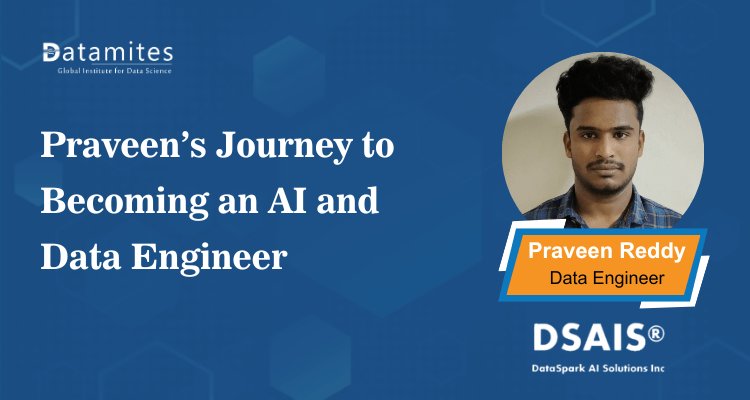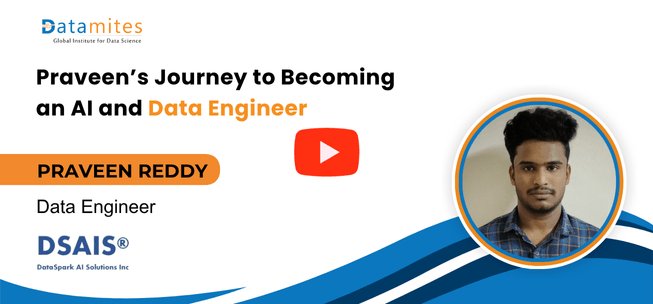From Electronics Engineer to AI/Data Engineer: Praveen’s Path to Success
Praveen’s career transformation from an electronics engineer to a successful AI and data engineer is a story of determination, upskilling, and adaptability. His journey serves as an inspiration for professionals looking to pivot their careers and thrive in the world of data and artificial intelligence.

Breaking into the world of Artificial Intelligence might seem like a dream reserved for computer science graduates and coding prodigies. But what if you come from a completely different background, say, Electronics Engineering and still dream of becoming an AI/Data Engineer? In an inspiring leap from circuits to code, Praveen transformed his career path by diving headfirst into data science, overcoming self-doubt, upskilling consistently, and eventually landing a job in AI. His story is proof that with determination, the right learning path, and real-world practice, anyone can pivot into the booming world of artificial intelligence.
From Learner to AI Engineer: Praveen’s Inspiring Q&A Journey with DataMites
In this insightful Q&A, we explore how Praveen transitioned from a curious learner to a full-time AI Engineer through his hands-on journey with DataMites.
Q1: Can you briefly introduce yourself and your current role?
Sure! My name is Praveen, and I'm from Andhra Pradesh. I currently work at DataSpark AI Solutions as an AI/Data Engineer. My journey into data science began after I completed my engineering in Electronics and Communication. I found my way into this field through dedicated training, hands-on projects, and a lot of self-learning.
Q2: What motivated you to move into data science?
During my final year of engineering, I worked on a project in collaboration with IBM. It focused on data science and gave me initial exposure to the field. I learned about the lifecycle of a data science project and realized this was something I wanted to pursue full-time. That’s when I decided to look for structured training and enrolled in a data science course to build a solid foundation.
Q3: How did you choose the right platform for your training?
I started researching online, watching YouTube reviews, and comparing options in Bangalore. I finally chose a platform based on their teaching methodology, curriculum depth, and placement assistance. The syllabus included core skills like Python, machine learning, deep learning, and big data essential components of any solid artificial intelligence course.
Q4: What was your learning experience like?
The experience was very positive. I opted for offline learning so I could interact with peers directly. That helped me immensely in debugging errors and understanding concepts more clearly. We often collaborated on solving coding challenges and discussing real-time issues, which added a lot of value to the learning journey.
The instructors were excellent. They explained Python fundamentals clearly, then progressed to libraries, data handling, and finally machine learning and deep learning. Every topic was explained deeply and precisely, making it easy to follow even for someone from a non-CS background like me.
Q5: Can you tell us about the projects you worked on during your training?
Absolutely. As part of our internship program, I worked on several capstone projects. Some of them included:
- Cell Phone Price Prediction
- House Price Prediction
- Heart Disease Prediction
- Credit Risk Analysis
We also participated in live client projects such as COVID-19 Data Analysis. These were invaluable experiences that allowed me to implement what I had learned.
Q6: How long did it take you to get a job in AI engineering?
It took me around six to seven months from the time I started learning data science to securing my first job. The first few interviews came quickly, but I took a break of about two months in between. After resuming, I continued preparing and practicing until I landed the job.
Q7: When did your internship and group projects begin?
The first three months of the program were purely focused on classroom training. We learned core concepts during that time. After that, around the fourth month, we began our internship phase, which was work-from-home. That’s when we started working on group projects.
Q8: What’s your advice for someone just starting out in data science or AI?
Be consistent. I recommend studying for at least two hours a day. Follow the curriculum step-by-step. Start with Python basics and its libraries like Pandas and NumPy. Then move on to data visualization tools like Matplotlib, followed by machine learning, deep learning, and eventually real-world projects.
Q9: As someone from a non-tech background, what challenges did you face?
I graduated in Electronics and Communication Engineering in 2023. During COVID, my learning was disrupted, and that’s when I realized electronics weren't the right fit for me. I gradually became interested in data science and computer science topics.
Q10: How did the placement process work for you?
The placement team shared job opportunities frequently two to three emails per week. Once your resume is shortlisted, you receive a call and proceed with the interviews. I found the placement pattern very systematic. The mock interviews and resume support played a huge role in building my confidence.
Q11: How do you plan to grow your skills further in data science?
I'm planning to continue learning through hands-on projects and continuous practice. I’m particularly interested in working with startups because of the learning curve and flexibility they offer. In the future, I also have business ideas that I’d like to pursue, possibly in the AI space.
Q12: Any Advice for Aspiring AI/Data Engineer?
If you're from a non-tech background or switching careers, don’t be discouraged. Choose a solid artificial intelligence course, be consistent with learning, work on real projects, and practice mock interviews. Stay curious, keep improving, and trust the process.
Refer these below articles:
- From Career Break to AI/Data Engineer: Kiruthiga’s Inspiring Journey
- From Graduate to AI/Data Engineer : Sachin’s Journey into the AI
- Aswathi’s Journey: From Electrical Engineer to AI/ML Engineer
Key Takeaways from Praveen’s Journey into AI/Data Engineer
From studying Electronics and Communication to becoming a full-time AI Engineer, his story is both inspiring and instructional. Here are the key takeaways from his successful transition into the world of AI and data.
- Non-Tech Background Isn’t a Barrier: Praveen transitioned from Electronics and Communication Engineering into AI, proving that a non-CS background can still lead to success in data science.
- Early Exposure Sparked Interest: A final-year college project with IBM introduced Praveen to the data science lifecycle, motivating him to pursue it professionally.
- Choosing the Right Course Matters: He selected a structured artificial intelligence course based on curriculum depth, reviews, and placement assistance to build his foundation.
- Offline Learning Boosted Understanding: Opting for offline classes enabled peer interaction and collaborative problem-solving, which enhanced his grasp of technical concepts.
- Strong Curriculum Coverage: His course included essential AI skills like Python, machine learning, deep learning, big data, and project-based learning.
Read these below articles:
- The Rise of Artificial Intelligence Demand in Faridabad
- Rising Demand for Artificial Intelligence in Agra
- The Growing Demand for Artificial Intelligence in Allahabad
Praveen’s story is a powerful testament to how dedication, the right guidance, and hands-on experience can transform an aspiring student into a successful AI professional. His transition from electronics engineering to working on real-world AI projects proves that with the right tools and mindset, anyone can make the leap. According to ABI Research, the AI software market is projected to grow at a compound annual growth rate (CAGR) of 25%, reaching a value of USD 467 billion by 2030.
If you’re thinking about starting a career in AI or data science, stories like Praveen’s are a great source of inspiration. The key? Join the artificial intelligence course in bangalore that goes beyond theory and focuses on real, hands-on projects. That’s where real learning and real transformation begins.
DataMites offers a comprehensive, industry-relevant AI training program tailored for both beginners and professionals. Whether you're located in Kudlu Gate, BTM Layout, Marathahalli, or surrounding areas, the DataMites Artificial Intelligence Institute in Bangalore provides a convenient and effective way to learn artificial intelligence and advance your career. With flexible schedules, expert trainers, and robust placement support, getting started in AI has never been easier.
DataMites has established itself as a leading provider of AI training in India, earning recognition from Analytics India Magazine alongside esteemed institutions such as IITs and IIMs. Learners of the program receive internationally acknowledged certifications from IABAC and NASSCOM FutureSkills, enhancing their professional credibility and opening doors to promising career opportunities in the AI job market.

